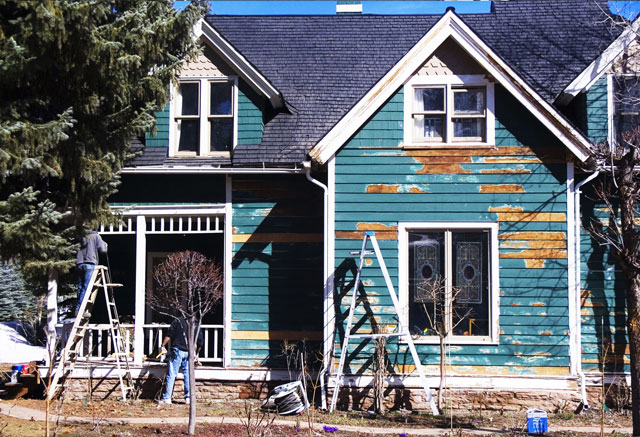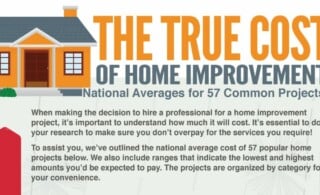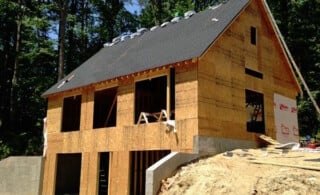
The prospect of buying a home for far less than it’s worth and then investing in necessary renovations seems like an ideal situation. However, if the minor repairs you are expecting transform into significant issues, your dream of owning a beautiful home can soon turn into a nightmare-inducing reality. Therefore, before getting too deep into the world of the fixer-upper, you need to educate yourself. In so doing, you will ensure your fixer-upper works for you, not the other way around.
Before You Buy
Determine How Much of The Work You Will do Yourself:
Although renovating a home on TV looks virtually effortless, it is far from an easy endeavor. In many cases, you will have to hire help to ensure your home is renovated properly. There is no shame in this, after all, we aren’t all electricians and plumbers. To give you an idea of the costs you might be looking at when hiring these popular professionals, consider the following numbers:
| Contractor | Approx. Cost (according to our True Cost Guides) |
|---|---|
| Electrician | $320 |
| Plumber | $300 |
| Roof Repair | $865 |
| Flooring | $775 |
| Drywall | $500 |
| A/C & Heating | $340 |
The numbers above represent the most basic costs associated–think the simplest project without any complications. If the job involves more than simple repairs and becomes a complete overhaul, expect a much higher number. This brings us to our second point:
Know What to Avoid:
Not all home renovations are created equal. Some require elbow grease and effort and others require extensive, costly repairs that should only be completed by professionals. Below, you will find a few “red flag” repairs you will want to avoid as they are the items that quickly turn your dream home into a money pit. At the very least knowing these issues are present will give you a heads up going in, allowing you to devote more resources towards renovation needs.
Home Repairs to Avoid if Possible:
- Foundation Repair
- Roof Repair or Replacement
- Plumbing Problems
- Electrical Problems
Foundation Problems
Your foundation is one the most important structural elements of your home. If your foundation is in need of repair, you will be spending significant money to fix it. According to our national survey, the average total for foundation repair is around $4,000.
Signs of a Foundation Problem:
- Crumbling or flaking of the foundation.
- Gaps or ruptures in the foundation.
- Buckling, sagging or sloping foundation floors or walls.
- Moisture, including stains, mold or pooling water.
- Fractures or cracks in the foundation. They can be zigzagging, horizontal or vertical.
Roof Issues
Replacing the roof of your home is another expensive repair you might face during your remodel. Roof problems can lead to all kinds of other issues as well, like mildew, mold, structural damage and electrical issues due to leaks. The national average cost to install a new roof at $7,200.
Thankfully, by climbing a ladder, you can check the roof out yourself; however, you should take extreme caution while you inspect it. Of course, in some cases, you can see these issues even from the ground. Look for the following signs:
- Bare spots on the roof where shingles are missing.
- Curled shingles: This can indicate a problem with moisture build up when there is upward curling.
- Clawing: Clawing on the bottom corners, curling the shingle inward. This is a normal part of aging but does indicate the shingles soon to be in need of replacement.
- Broken shingles.
- Buckling Shingles: This is when the shingles look visibly wavy or buckled.
Plumbing Problems
Another costly area of concern can be just under the floors or behind cabinet doors in your home, in the plumbing. Potential issues include clogs, corrosion, and leaks. This can perpetuate foundation and mold issues and lead to a high water bill or worse. New pipes and installation cost $1,050, and to install a new water main, will cost you around $1,500. This cost doesn’t even include the costs of sewer line or septic tank issues.
Signs of these can be difficult to spot before purchasing a property since vacant homes often have the water turned off. However, it’s worth asking about. If need be, hire a plumber to look at the home and see what you are dealing with before purchasing. Here are some common signs of a plumbing problem:
- A never-ending drip.
- A slow drain.
- Water appearing where it shouldn’t be.
- Toilets and/or tubs that aren’t draining.
Electrical Issues
Electrical problems can be dangerous if unaddressed, making them something you simply cannot overlook. The national average to upgrade or replace an electrical panel is around $1,110, installing electrical wiring averages $1,280. Something as small as installing an outlet will cost you around $200. If your house needs a significant electrical overhaul, you can see how the cost would quickly escalate. Don’t ignore the following signs because faulty systems can be hazardous to leave unfixed:
- Electrical outlets that are hot to the touch, buzz or have char marks.
- Feeling a vibration, shock or buzz when you plug in an appliance.
- Breakers that trip often.
- It’s outdated. Although commonplace in the 1960s and 1970s, aluminum wiring is a major problem today. It expands and contracts seasonally, causing loose connections, which is a dangerous fire hazard. Therefore, even if you aren’t seeing the signs listed above, if the wiring is too old, it’s a good idea to update it all.
Don’t Over Pay:
After you do all the research involved including pricing the cost of professionals to come into your home and handle the various repairs as well as ensuring there are no “red flag” issues present, you are ready to move on to the next step. This step is ensuring you don’t overpay when buying your fixer-upper. To do this, figure out the market value of your home, post renovations. You can find this number by looking at the real estate listings for similar sized home’s nearby. Then, subtract the renovation costs, plus 10 to 20% more for unseen repairs, from that number. This new amount should be the max you put into buying a fixer-upper. To pay more, would mean you are spending more than the house will be worth, once all your repairs are completed.
 Creating the Optimal Living Environment for a Child with ADHD
Creating the Optimal Living Environment for a Child with ADHD  This Year’s Popular Remodeling Choices
This Year’s Popular Remodeling Choices  Top 6 Home Improvement Investments
Top 6 Home Improvement Investments  The True Cost of Home Improvement
The True Cost of Home Improvement  How Long Will Your Home Be Under Construction?
How Long Will Your Home Be Under Construction? 

Are You Familiar With This Topic? Share Your Experience.